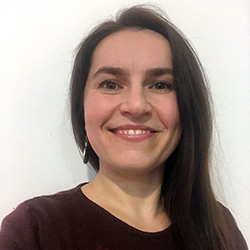by Anna Isaieva, HUSI 2021
 “Ukr.lit.” or Ukrainian literature – this subject name was present in all my school planners for 7 of my ten years in school. Twice a week we had ukrlit and ukrmova (Ukrainian language class). Literature should have been my favorite subject because I like stories and reading (and was remarkably bad in other subjects). It should have been, but it was not…
“Ukr.lit.” or Ukrainian literature – this subject name was present in all my school planners for 7 of my ten years in school. Twice a week we had ukrlit and ukrmova (Ukrainian language class). Literature should have been my favorite subject because I like stories and reading (and was remarkably bad in other subjects). It should have been, but it was not…
Despite the warm class atmosphere, non-stressful homework, and the unforgettable Oksana Georgiivna (our young and enthusiastic Ukrainian class teacher), I barely survived 45 minutes of ukrlit. The reasons for this were complex, interconnected and, probably, subjective: boring texts, an excessive focus on the redemptive value of suffering, “village” settings which were alienating and unfamiliar to someone raised in the city. Thus my general attitude towards Ukrainian literature was not one of excitement, but rather boredom. And so for a long time afterward Ukrainian literature was not part of my interests.
Until I just by chance attended a lecture in university on the personal interrelationships of the writers of the executed renaissance (a term for the generation of literary luminaries whose careers and lives were cut short by Stalin’s purges). Faceless surnames from class readers suddenly became alive, full-blooded humans, with passions, hopes, and failures. I rediscovered some texts but felt that I lacked knowledge and context. Therefore, I decided to seek some professional guidance.
 Professor Grabowicz’s class on canon of Ukrainian literature sounded like the right choice. I expected to receive context, immerse myself in the texts and “see” the deeper, hidden meanings. Instead, I learned how… to read.
Professor Grabowicz’s class on canon of Ukrainian literature sounded like the right choice. I expected to receive context, immerse myself in the texts and “see” the deeper, hidden meanings. Instead, I learned how… to read.
Before, I thought I knew how to read; at least, I should certainly hope so given that I hold multiple advanced degrees. But as I learned during the course, people who value and understand literature read in a completely different way. Plot twists and unexpected turns, previously my main criteria, are just one aspect of a writer’s work. The class has a particular focus on “close reading” which allows one to discover a whole hidden world even in short poem (if the poet is talented). Writers “speak” with each other via allusions and associations. Poetry is a state of being and can be written in prose. This course gave me a new look into the literary life of both Ukraine and the world.
The school subject I found so boring is actually very, very interesting.
It was a privilege to learn more about the “executed renaissance” as a cultural tragedy. The abrupt loss of so many talented, often young, versatile authors who uplifted the Ukrainian language and literature to a new level robbed the country of what could have been a golden literary age, were it not so quickly cut short.
It was also interesting to get better acquainted with the work of Soviet authors, many of whom I was previously almost allergic to. It can be interesting and is interesting. To truly appreciate this work, one needs time and some contextual knowledge. And it appears that previously overlooked authors or writers whose essays bored schoolchildren half to death can, in fact, be interesting for an adult, when guided through the readings by an expert in the field.
All this is not to say that these writers should not be taught in school. The Ukrainian primary education literature curriculum is often criticised on the grounds that it kills interest, that texts are inappropriately selected and pupils are too young to understand the deeper meanings of the readings. I would not be so radical. Courses on literature are an obligatory part of school curriculums. They provide a needed overview and make the first, and often only, encounter with literary works for many people. Realistically, yes, it is true that the majority of schoolchildren will not become passionate enthusiasts for the poetry of Voldymyr Sosiura or Pavlo Tychyna, but at least they will be aware that the Ukrainian language is capable of artistic expression, that it goes beyond what they may encounter in popular culture or children’s literature. Rather than criticising literature courses in school curricula as such, it would be more useful to focus on teaching proper reading techniques, with deeper context and more time allotted to enjoy and reflect on the material.